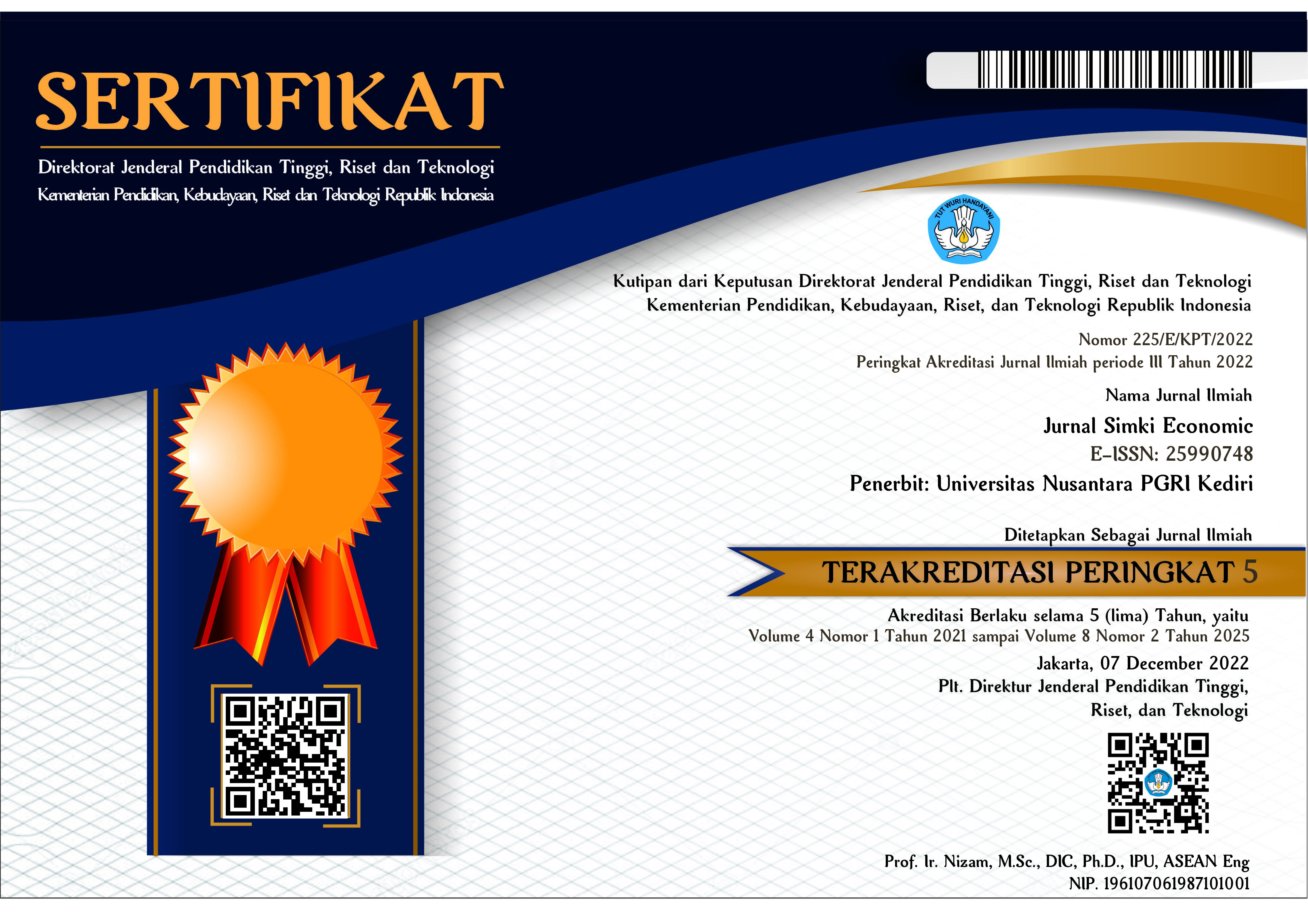Memprediksi Determinan Kinerja Karyawan Pada Sektor Perbankan BUMN Regional
 Abstract views: 310
,
Abstract views: 310
,
 PDF (Bahasa Indonesia) downloads: 299
PDF (Bahasa Indonesia) downloads: 299
Abstract
The current study aims to investigate the impact of motivation, reward, and work discipline affect the performance of employees in the regional banking sector. Multiple regression analysis based on data from 70 employees of Bank Rakyat Indonesia (BRI) Tbk. Census sampling method was performed to prove the research hypothesis. The results show a positive and significant relationship between rewards, work discipline and employee performance. In contrast, the motivation found did not play a role in improving employee performance. Theoretically, these findings provide an indication of new enrichment regarding the interaction of the synergy of motivation, rewards and work discipline to influence employee performance in an area. Managerially, leaders can develop strategic human resource management plans that are relevant to the company context.
Downloads
References
Baroudi, S., Tamim, R., & Hojeij, Z. (2022). A Quantitative Investigation of Intrinsic and Extrinsic Factors Influencing Teachers’ Job Satisfaction IN Lebanon. Leadership and Policy in Schools, 21(2), 127–146. https://doi.org/10.1080/15700763.2020.1734210
Bhardwaj, A., Mishra, S., & Jain, T. K. (2020). An analysis to understanding the job satisfaction of employees in banking industry. Materials Today: Proceedings, 37(Part 2), 170–174. https://doi.org/10.1016/j.matpr.2020.04.783
De Gieter, S., & Hofmans, J. (2015). How reward satisfaction affects employees’ turnover intentions and performance: an individual differences approach. Human Resource Management Journal, 25(2), 200–216. https://doi.org/https://doi.org/10.1111/1748-8583.12072
DeCenzo, D. A., Robbins, S. P., & Verhulst, S. L. (2015). Fundamentals of Human Resource Management (12th ed.). Wiley. Retrieved from https://www.wiley.com/en-us/Fundamentals+of+Human+Resource+Management%2C+12th+Edition-p-9781119158905
Dessler, G. (2017). Human resource management (15th ed.). Boston: Pearson Education, Inc.
Lopes, J., & Oliveira, C. (2020). Teacher and school determinants of teacher job satisfaction: a multilevel analysis. School Effectiveness and School Improvement, 31(4), 641–659. https://doi.org/10.1080/09243453.2020.1764593
Macke, J., & Genari, D. (2019). Systematic literature review on sustainable human resource management. Journal of Cleaner Production, 208, 806–815. https://doi.org/10.1016/J.JCLEPRO.2018.10.091
Maharani, N., & Sevriana, L. (2017). Analysis of Attitude, Motivation, Knowledge and Lifestyle of the Consumers in Bandung Who Shop through Instagram. The Winners, 18(1), 13. https://doi.org/10.21512/tw.v18i1.4049
Malik, A. (2018). Introduction. In Strategic Human Resource Management and Employment Relations (pp. 3–11). Springer. https://doi.org/10.1007/978-981-13-0399-9_1
Malik, M. A. R., Butt, A. N., & Choi, J. N. (2015). No Rewards and employee creative performance: Moderating effects of creative self-efficacy, reward importance, and locus of control. Journal of Organizational Behavior, 36(1), 59–74. https://doi.org/https://doi.org/10.1002/job.1943
Mangkunegara, A. P. (2017). Manajemen Sumber Daya Manusia Perusahaan. Bandung: Rosda.
Newman, W. L. (2014). Social Research Methods: Qualitative and Quantitative Approaches (Seventh Ed). Pearson Education, Inc.
Rai, A., Ghosh, P., Chauhan, R., & Singh, R. (2018). Improving in-role and extra-role performances with rewards and recognition. Management Research Review, 41(8), 902–919. https://doi.org/https://doi.org/10.1108/MRR-12-2016-0280.
Sekaran, U., & Bougie, R. (2016). Research methods for business : a skill-building approach. Wiley. Retrieved from https://www.wiley.com/en-us/Research+Methods+For+Business%3A+A+Skill+Building+Approach%2C+7th+Edition-p-9781119266846
Siengthai, S., & Pila-Ngarm, P. (2016). The interaction effect of job redesign and job satisfaction on employee performance. Evidence-Based HRM, 4(2), 162–180. https://doi.org/10.1108/EBHRM-01-2015-0001/FULL/XML
Tarigan, B., & Priyanto, A. A. (2021). Pengaruh Motivasi dan Disiplin terhadap Kinerja Karyawan pada PT Bank DBS Tangerang Selatan. WACANA EKONOMI (Jurnal Ekonomi, Bisnis Dan Akuntansi), 20(1), 1–10. https://doi.org/https://doi.org/10.22225/we.20.1.2890.1-10
Tarigan, J., Cahya, J., Valentine, A., Hatane, S., & Jie, F. (2022). Total reward system, job satisfaction and employee productivity on company financial performance: evidence from Indonesian Generation Z workers. Journal of Asia Business Studies, 16(6), 1041–1065. https://doi.org/https://doi.org/10.1108/JABS-04-2021-0154
Yuen, K. F., Loh, H. S., Zhou, Q., & Wong, Y. D. (2018). Determinants of job satisfaction and performance of seafarers. Transportation Research Part A: Policy and Practice, 110, 1–12. https://doi.org/10.1016/j.tra.2018.02.006
Copyright (c) 2023 Waode Atika Sri Amaliah, Salim Basalamah, Sanusi

This work is licensed under a Creative Commons Attribution 4.0 International License.














